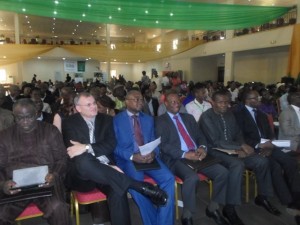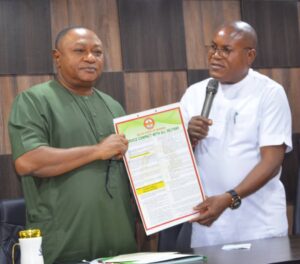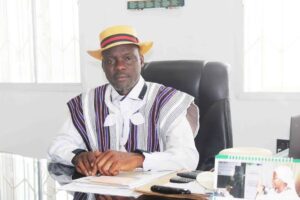MSMEs Contributes 46.54% to Nation’s GDP – 2010 SMEDAN’s Survey
Tejir Ebikeme/Francis Sadhere
Micro, Small and Medium Enterprises (MSMEs) in Nigeria contributes 46.54% to the nation’s Gross Domestic Product (GDP), with a total employment of 32,5 million from a total number of 17,3 million MSMEs in Nigeria, according to 2010 National MSMEs survey conducted by the Small and Medium Enterprises Development Agency of Nigeria (SMEDAN).

Cross Section of participants at the second Niger Delta Development Forum, held in Benin, Edo State.
This was revealed by the Director General/CEO, SMEDAN, Hon. Bature Umar Masari while giving his keynote address at the second edition of the Niger Delta Development Forum, with the theme; “Promoting new approaches for Micro, Small and Medium Enterprises Development of the Niger Delta,” organized by the Foundation for Partnership Initiative in the Niger Delta (PIND), yesterday, at the Best Western Homeville Hotel, Benin City, Edo State.
Hon. Masari explained that the survey also revealed that other community, social and personal services, real estate, renting, and business activities and agricultural activities recorded the highest, representing 99.98%, 99.13% and 98.01% respectively, while building, construction and financial intermediation recorded the lowest, representing 10.76% and 5.32% respectively.
Hon. Masari said that the 2010 survey also revealed that 73.24% of the topmost priority of assistance needed by MSMEs operators was finance, lamenting that only 4.2% of the 17.3 million MSMEs have been able to access loans or overdraft from financial institutions while new entrants or start-ups find it practically impossible to access funds from banks.
He however, said that in order to solve the above problem, the Federal Government had developed the National Enterprise Development Programme (NEDEP) aimed at generating an estimated 5.0 million direct and indirect jobs between 2013 and 2015 with focus on skills acquisition, entrepreneurship training/business development services (BDM) and access to finance.
He said; “In order to ensure seamless implementation of the NEDEP programme, an implementation structure has been developed. At the top of this structure is the national Council on MSMEs to be headed by the Vice President. This council is yet to be inaugurated. At the state level, there is the State Council on MSMES. This is headed by the governor.”
In his recommendation, Hon. Masari said that for the MSMEs to be able to play an important role in economic development, programmes and policies that promotes stable financial development, effective and secure financial system, good/strong institutions at all levels of government, good infrastructure and facilities, high level of entrepreneurship, promotion of access to innovation and technology, appropriate rules and regulations that encourage fair competition and stable policies targeted at MSMEs that provide sustained support and guidance and encourage investment in the sector, must be promoted.
According to him; “Nigeria has abundant human, physical and other tangible resources necessary for rapid socio-economic development; these are however not sufficient due to the inability to synergize collectively individual entrepreneurial capabilities and capacities.”
He stressed that SMEDAN, which was mandated to promote the development of MSMEs, was ready to collaborate with other agencies to promote the platform and opportunity to synergize and strategize towards a vibrant and robust agenda for efficient and sustainable micro and small enterprises in the Niger Delta region.
Hon. Masari reiterated that the key to the “economic emancipation of Nigeria lies in the generation of sufficient financial revenue, foreign exchange, increased employment and the opening of her borders to global competition.”
Earlier, the Executive Director of PIND, Mr. Sam Daibo in his welcome address, stressed the need for government to act as an enabler of development for the good of all as well as promoting policies and incentives that can create access to existing and new markets both domestic and international.
He said this year’s forum was part of PIND’s work in stimulating policy debate aimed at creating opportunities to support development in the region, adding that PIND believed in the power of partnership and that was why they were linking up with partners from the public and private sector to bring together multi-stakeholder audiences and development actors both within and outside Niger Delta region.
Mr. Daibon noted that there was an increasing recognition of the pivotal role of MSMEs in employment generation, income redistribution and wealth creation in many developing nation, emphasizing that promoting new approaches for MSMEs development in the Niger Delta would contribute to contribute to the broader economic development of the country at large.
While identifying low market access, poor access to land, poor information flow, high lending rate, access to appropriate production and processing technology, and energy amongst the challenges bedeviling MSMEs in the country, Mr. Daibo said there was need for the real sectors to live up to its full potentials and take proactive measures that can revamp operations of value chain actors.
He said ; “A business environment in which large multi-national corporations and MSMEs can thrive is the product of a symbolic relationship between all relevant stakeholders – public sectors agencies, business membership organizations, large corporations, multi and bilateral organizations, large and small.
“With NDDF, our aim is to provide a joint platform and and opportunity for like-minded organizations and individuals across the Niger Delta and beyond; to inform knowledge and influence policies, attitudes and behaviours and leverage resources that will re-position the Micro, Small and Medium Enterprises in the Niger Delta on the path of economic growth and competitiveness,” he added.
He also hoped that the forum would boost partnership and shared learning and collective action among MSMEs operators, and support for promoting evidence and research-based policies by policy-makers by the end of the forum in the coming months ahead.
In his opening address, the Chief Host, Professor Julius Ihonvbere, Secretary to the State Government, Edo State, represented by the Commissioner for Agriculture, Hon. Abdul Oro, said Edo state under the administration of Governor Adams Oshiomole have created the enabling environment for both small and big businesses to thrive, noting that 85% of its budget goes to capital projects in spite of its meager allocation.
While commending PIND for organizing the forum, the SSG also revealed that about 750 thousand tons of Garri were being shipped from Edo State to other countries, stressing that Nigerians were doing well all over the world.
He said; “Edo state has shown that we cannot continue to lament the past. We must put on our thinking caps and think of the way forward for our country. Everybody in this country must lead by example. It is very important to note that the informal sector is bigger than the formal sector. We have Nigerians doing business all over the world and they are excelling. To get out of this quagmire, Nigeria must take a second look at our operating system.”
The forum is being attended by development practitioners, MSMEs/members of BMOs, private sector/market development practitioners, think tanks, academia, students, banks/financial institutions, multilateral/bilateral, private organizations, government ministries, departments and agencies among others.



